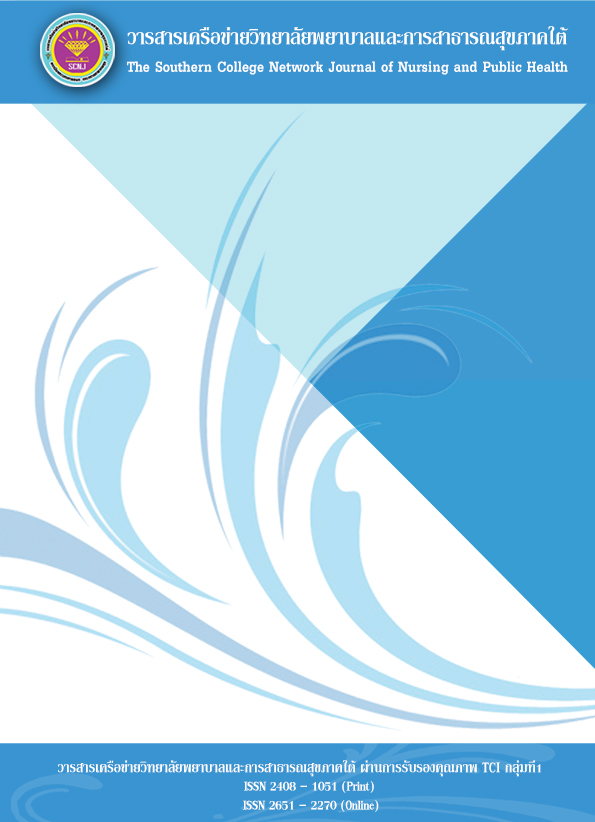ความสัมพันธ์ระหว่างการใช้สื่ออิเล็กทรอนิกส์กับพัฒนาการเด็กอายุ 2-5 ปี ในศูนย์พัฒนาเด็กเล็ก สังกัดองค์กรปกครองส่วนท้องถิ่น จังหวัดสงขลา
คำสำคัญ:
พัฒนาการเด็ก, การใช้สื่ออิเล็กทรอนิกส์บทคัดย่อ
วิจัยเชิงบรรยายแบบวิเคราะห์ความสัมพันธ์นี้ มีวัตถุประสงค์เพื่อศึกษาความสัมพันธ์ระหว่างการใช้สื่ออิเล็กทรอนิกส์กับพัฒนาการเด็กอายุ 2-5 ปี ในศูนย์พัฒนาเด็กเล็ก สังกัดองค์กรปกครองส่วนท้องถิ่น จังหวัดสงขลา กลุ่มตัวอย่างเป็นคู่ของผู้ปกครองและเด็ก จำนวน 210 คู่ เครื่องมือที่ใช้ คือ แบบสอบถามข้อมูลทั่วไป แบบสอบถามการใช้สื่ออิเล็กทรอนิกส์ของเด็กและครอบครัว แบบบันทึกการใช้สื่ออิเล็กทรอนิกส์ของเด็ก คู่มือเฝ้าระวังและส่งเสริมพัฒนาการเด็กปฐมวัย และแบบบันทึกการเฝ้าระวังและส่งเสริมพัฒนาการเด็กปฐมวัยตามช่วงอายุ วิเคราะห์ข้อมูลสถิติทดสอบไคสแควร์ ผลการวิจัยพบว่า
1. พัฒนาการเด็กโดยรวมและรายด้าน ร้อยละ 62.9 ของเด็กอายุ 2-5 ปี มีพัฒนาการเหมาะสมตามวัยทุกด้าน เมื่อแยกพัฒนาการรายด้าน พบว่าเด็กมีพัฒนาการไม่สมวัยในด้านการเข้าใจภาษามากที่สุด (22.9 %) รองลงมา ได้แก่ การช่วยเหลือตนเองและสังคม (10.5 %) การเข้าใจภาษา (9.5 %) กล้ามเนื้อมัดเล็กและสติปัญญา (6.7 %) และการเคลื่อนไหว (3.8 %) ตามลำดับ
2. ความสัมพันธ์ระหว่างการใช้สื่ออิเล็กทรอนิกส์กับพัฒนาการเด็กโดยรวม พบว่า ระยะเวลาที่ใช้สื่ออิเล็กทรอนิกส์ในวันธรรมดา ระยะเวลาที่ใช้สื่ออิเล็กทรอนิกส์ในวันหยุด จำนวนของสื่ออิเล็กทรอนิกส์ การมีส่วนร่วมของผู้ปกครองในขณะเด็กใช้สื่ออิเล็กทรอนิกส์ มีความสัมพันธ์กับพัฒนาการโดยรวมของเด็กอย่างมีนัยสำคัญทางสถิติที่ระดับ .05 ( =11.939, p=0.001; =6.861, p=0.009; =7.558, p=0.006; และ =12.404, p=0.002 ตามลำดับ) ส่วนลักษณะเนื้อหาของสื่ออิเล็กทรอนิกส์ไม่มีความสัมพันธ์กับพัฒนาการเด็กโดยรวม
3. ความสัมพันธ์ระหว่างการใช้สื่ออิเล็กทรอนิกส์กับพัฒนาการเด็กแยกเป็นรายด้าน พบว่า ระยะเวลาที่เด็กใช้สื่ออิเล็กทรอนิกส์ในวันธรรมดา และจำนวนของสื่ออิเล็กทรอนิกส์มีความสัมพันธ์กับพัฒนาการด้านการเข้าใจภาษาอย่างมีนัยสำคัญทางสถิติที่ระดับ .05 ( =9.094, p=0.003; และ =4.313, p=0.038 ตามลำดับ) และพัฒนาการด้านการช่วยเหลือตนเองและสังคม พบว่า ระยะเวลาที่เด็กใช้สื่ออิเล็กทรอนิกส์ในวันธรรมดา มีความสัมพันธ์กับพัฒนาการด้านการช่วยเหลือตนเองและสังคมอย่างมีนัยสำคัญทางสถิติที่ระดับ .05 ( =4.683, p=0.030) นอกจากนี้พบว่า ระยะเวลาที่เด็กใช้สื่ออิเล็กทรอนิกส์ในช่วงวันธรรมดา ระยะเวลาที่เด็กใช้สื่ออิเล็กทรอนิกส์ในช่วงวันหยุด จำนวนของสื่ออิเล็กทรอนิกส์ ลักษณะเนื้อหาของสื่ออิเล็กทรอนิกส์ และการมีส่วนร่วมของผู้ปกครองในขณะเด็กใช้สื่ออิเล็กทรอนิกส์ ไม่มีความสัมพันธ์กับพัฒนาการของเด็กด้านการเคลื่อนไหว ด้านกล้ามเนื้อมัดเล็กและสติปัญญา และด้านการใช้ภาษา
เอกสารอ้างอิง
Brito, R. (2010). Information Communication Technology in Early Childhood Teachers and Children in Protuguese Pre-School. Retrieved from https://comum.rcaap.pt /bitsteam/123456789/2481/1/Edulearn%202010.pdf
Burn, N., & Grove, S. K. (2005). The Practice of Nursing Research: Conduct, Critique, & Utilization (5th ed). Philadelphia: W. B. Saunders.
Chonchaiya, V. (2018) Guidelines for Determining the Appropriate Age Range for Children to Use Online Media Through Smartphones and Tablets. Faculty of Medicine, Chulalongkorn University-Siriraj Hospital. Department of Development and Growth Department of Pediatrics Faculty of Medicine Chulalongkorn University. (in Thai)
Intusoma, U., Mo-suwana, L., Ruangdaraganon, N., Benjaporn, P., & Virasakdi, C. (2013). Effect of Television Viewing on Social-Emotional Competence of Young Thai Children. Infant Behavior and Development, 36, 679-685.
Lokutarapon, I. (2013). The Use of Technology in Learning Management for Preschool Children. Magazine Institute for the Promotion of Teaching Science and Technology, 41(161), 49-60. (in Thai)
Ministry of Education, Office of Social Promotion for Learning and Quality Youth. (2014). Open Early Childhood Situation Found One in Three Developmental Delays. Find Out from https://www.thaihealth.or.th/Content/19353.htm. (in Thai)
Ministry of Public Health, Department of Mental Health. (2015a). Development and Promotion of Early Childhood Development. Rajanagarindra Institute of Child Development. Chiang Mai. (in Thai)
Ministry of Public Health, Department of Mental Health. (2015b). Annual Report of the Department of Mental Health, 2015. Division of Planning, Department of Mental Health. Nonthaburi. (in Thai)
Mo-suwan, L. (2013). Report of the Consumer Behavior Survey on Nutrition and Health Behavior of Children Aged 6 Months -14 Years, Rattaphum District, July - August 2013. Monitoring Program on Changing Consumption Behavior and Long-Term Health Situation (Cohort) Study on the Integrated Food and Nutrition Project: A Case Study of Songkhla Province (Pages 1-27). Songkhla: Institute of Health System Management Prince of Songkla University. (in Thai)
National Association for the Education of Young Children. (2012). Technology and Interactive Media as Tools in Early Childhood Programs Serving Children from Birth Tgrough Age 8. Retrieved from https://www.naeyc.org/files/naeyc/file/position/PS_technology_WES2.pdf
Phatanapong, J., Boonsuwan C., & Thanajareanwat, N. (2014). Development of Early Childhood Development in Thailand. 2014. Office of Health Promotion, Maternal and Child Health. Bangkok: The Veterans Administration Hospital. (in Thai)
Pluprokan, R. (2010). How to Raise Early Childhood: Happiness in Thai Children. Pediatrics, 17 (2), 97-98. (in Thai)
Prommul, J., Klerlhee, T., Perngyai, C., & Suwanwaiphatthana, W. (2018). Nutritional Status of Pre-school Children with Participation of Families and Communities in Muang Songkhla. The Southern College Network Journal of Nursing and Public Health, 5(3), 169-185. (in Thai)
Srisatitnarakun, B. (2010). Nursing Research Methodology. Bangkok: U & I International Media. (in Thai).
Tanimura, M., Okuma, K., & Kyoshima, K. (2007). Television Viewing Reduced Parental Utterance and Delayed Speech Development in Infants and Young Children. Archives of Pediatrics and Adolescent Medicine, 161(6), 618-619.
ดาวน์โหลด
เผยแพร่แล้ว
ฉบับ
ประเภทบทความ
สัญญาอนุญาต
1. บทความหรือข้อคิดเห็นใด ๆ ที่ปรากฏในวารสารเครือข่าย วิทยาลัยพยาบาลและการสาธารณสุขภาคใต้ ที่เป็นวรรณกรรมของผู้เขียน บรรณาธิการหรือเครือข่ายวิทยาลัยพยาบาลและวิทยาลัยการสาธารณสุขภาคใต้ ไม่จำเป็นต้องเห็นด้วย
2. บทความที่ได้รับการตีพิมพ์ถือเป็นลิขสิทธิ์ของ วารสารเครือข่ายวิทยาลัยพยาบาลและการสาธารณสุขภาคใต้








